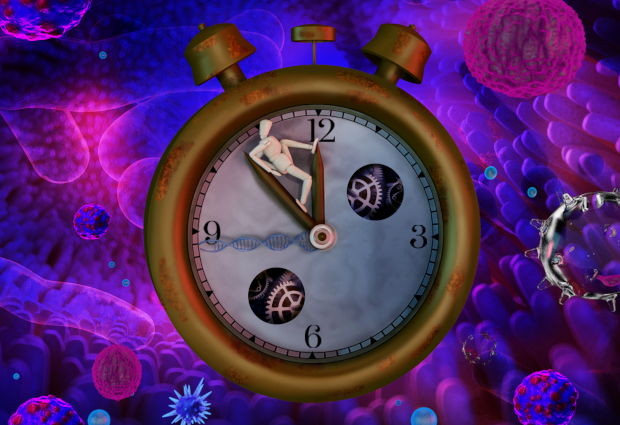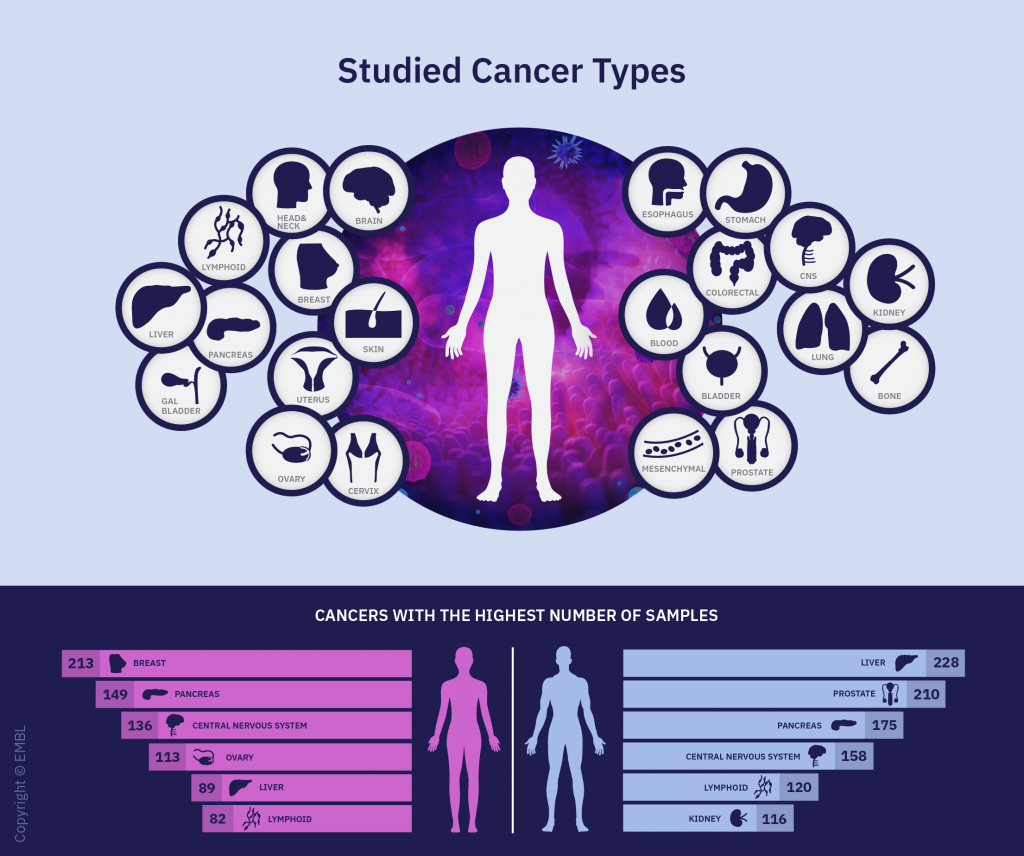
The Pan-Cancer project showed that there is a molecular clock in our cells. Credit: Rayne Zaayman-Gallant/EMBL
An international team, including scientists from EMBL and EMBL-EBI, has completed the most comprehensive study of whole cancer genomes to date, significantly improving our fundamental understanding of cancer and marking out new directions for its diagnosis and treatment. A key finding is that it’s possible to identify mutations in the genome that occurred years, or even decades, before a tumour appears – theoretically opening a window of opportunity for early cancer detection. The results of the project are published today in more than 20 papers in Nature and its affiliated journals.
The Pan-Cancer Analysis of Whole Genomes project is a collaboration involving more than 1300 scientists and clinicians from 37 countries. It involved analysis of more than 2600 genomes of 38 different tumour types, creating a huge resource of primary cancer genomes. This was the starting point for 16 working groups to study multiple aspects of cancer development, causation, progression, and classification. “This huge international study was only possible due to the work and collaboration of more than a thousand researchers and clinicians across the world, and I would like to thank everyone involved,” says Pan-Cancer steering committee member Dr. Jan Korbel from EMBL Heidelberg.

Credit: Rayne Zaayman-Gallant/EMBL
Most previous studies have focused on the 1% of the genome that codes for proteins. The Pan-Cancer project explored in considerably greater detail the remaining 99% of the genome. “There have been several studies in the past dealing with cancer genomes, but these studies typically looked at protein-coding genes only,” explains Dr. Sebastian Waszak, former postdoc at EMBL. “These are only a small fraction of our genetic blueprint. Through the Pan-Cancer project we can now better understand that cancer-causing mutations occur not only in genes but also in regions that switch genes on and off.”
The Pan-Cancer project has extended and advanced methods for analysing cancer genomes. By applying them to this large dataset, it has revealed new knowledge about cancer biology and confirmed important findings from previous studies.
The first wave of results is published today and shows that the cancer genome is finite and knowable, but enormously complicated. “Cancer is complex, and we need even more data to fully understand it. However, I’m positive that the cancer genome is solvable: it can be understood!” explains Jan Korbel. By combining sequencing of the whole cancer genome with a suite of analysis tools, the researchers were able to characterise every genetic change found in a cancer, all the processes that have generated those mutations, and even the order of key events during a cancer’s life history.
Researchers are close to cataloguing all of the biological pathways involved in cancer and having a fuller picture of their actions in the genome. At least one causal mutation was found in almost all of the cancers analysed, and the processes that generate mutations were found to be hugely diverse – from changes in single letters of the DNA code to the reorganisation of whole chromosomes. Multiple novel regions of the genome controlling how genes switch on and off were identified as targets of cancer-causing mutations.
“This work is helping to answer a longstanding medical difficulty: why two patients with what appear to be the same cancer can have very different outcomes to the same drug treatment. We show that the reasons for these different behaviours are written in the DNA. The genome of each patient’s cancer is unique, but there are a finite set of recurring patterns, so with large enough studies we can identify all these patterns to optimise diagnosis and treatment,” says steering committee member Dr. Peter Campbell from the Wellcome Sanger Institute in the UK.
Through a method of ‘carbon dating’, Pan-Cancer researchers – involving Dr. Moritz Gerstung and his group from EMBL-EBI in Hinxton – discovered that it is possible to identify mutations in the genome that occurred years, or sometimes even decades, before the tumour appears. Theoretically, this opens a window of opportunity for early cancer detection.
“We have learned that cancer is the endpoint of a lifelong evolutionary process that drives our cells. This process is fuelled by mutations in the cells’ genomes. These mutations occur as we age. Usually, there are no consequences to these mutations, but sometimes the consequences can be dramatic,” says Gerstung. “This process usually culminates within the decades prior to cancer diagnosis, but in some cases we have been able to identify alterations as old as the patient.”
Tumour types can be accurately identified by examining the patterns of genetic changes seen throughout the genome. This has the potential to aid diagnosis of a patient’s cancer where its type could not be determined by conventional clinical tests. Knowledge of the exact tumour type could also help to tailor treatments for specific patients.
“The results from the Pan-Cancer project will help patients that already have cancer to the extent that we now have a much better molecular explanation for what might be driving their cancer. So we now have a better panorama of which mutations likely cause their disease. And if we know what’s causing the disease then we have a better chance of treating it,” says Joachim Weischenfeldt, group leader at the Biotech Research & Innovation Centre in Copenhagen.
On top of the discoveries that have already been made, the Pan-Cancer project equips scientists with a comprehensive resource for cancer genomics research, including the raw genome sequencing data, software for cancer genome analysis, and multiple interactive websites exploring various aspects of the Pan-Cancer project data. “We have established a resource for the scientific community to drive forward cancer research,” says Jan Korbel.
